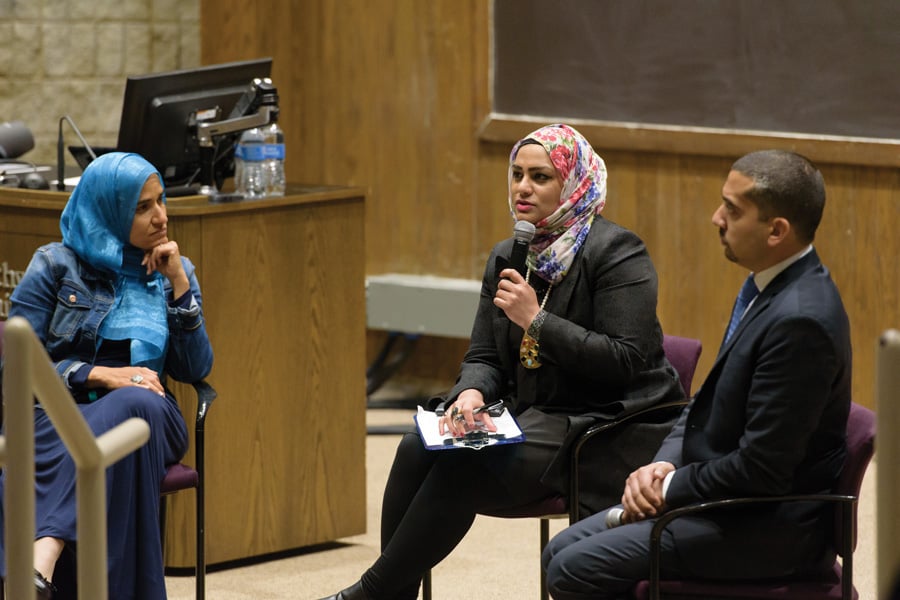McSA speakers discuss fighting Islamophobia in Trump era
Jeffrey Wang/Daily Senior Staffer
Dalia Mogahed and Mehdi Hasan speak with moderator Tahera Ahmad at Leverone Hall on Friday. The speakers discussed how Muslims have a “special role” in fighting bigotry and how they need to take more civic action during an event hosted by the Muslim-cultural Students Association.
May 14, 2017
With the election of President Donald Trump, Islamophobia is a larger problem now than ever and anyone can be a target of prejudice, scholar Dalia Mogahed said during an event Friday.
Mogahed, director of research at the Institute for Social Policy and Understanding, was joined by award-winning British political journalist, broadcaster and author Mehdi Hasan during an event hosted by the Muslim-cultural Students Association. Addressing an audience of about 90 people in Leverone Hall, Mogahed and Hasan discussed how Muslims are affected by the current political climate, and how every American can work to end Islamophobia.
“There is an overlap between the phenomena that is targeting Muslims and the same people with the same agenda targeting other marginalized communities,” Mogahed said. “Islamophobia is not just against Muslims. It is a symptom of a wider problem.”
The event was moderated by Tahera Ahmad, associate chaplain and director of interfaith engagement. Ahmad said Islamophobia is a topic that is “really pertinent” and something “we’ve been talking about all over the country.”
During the talk, Mogahed discussed how Muslims are the target of faith-based and employee-based discrimination due to Islamophobia.
Still, Mogahed said, Islamophobia affects everyone beyond just the 1 percent of Americans who identify as Muslim to pollsters. Other forms of bigotry against African Americans and Jews have similar origins as Islamophobia, she said.
“The level of Islamophobia that we have today in our country is a threat to every single American,” Mogahed said. “It’s not just a threat to the 1 percent; it’s a threat to the 100 percent. As a threat to every single American, we all have a role to play in saving our country from itself.”
Mogahed said Muslims, who are among the most visible targets of bigotry, have a “special role” to play in fighting prejudice. Hasan said Muslims must vote and get involved in politics to combat prejudice, which he said is rampant in present-day America.
Although a record number of Muslim Americans registered to vote in the 2016 presidential election, Hasan said they should have been active much earlier.
“Without a coordinated, collective, relentless, engaged, funded political response, Muslims are never going to get anywhere in terms of changing the odds that are stacked against us,” Hasan said.
Even as an outsider to the U.S. government, Hasan said he is in awe of the opportunities Americans have to make an impact and vote for many positions in the local and national governments. Muslim Americans should take full advantage of these opportunities, he said.
Weinberg senior Joji Syed said she attended the talk because she is a fan of Hasan. Syed said his messages of tolerance and resistance must be heard by students and individuals everywhere.
“The big thing is acting on what’s happening,” Syed told The Daily. “It’s really easy to sit there and vent about it, and it’s really easy to feel upset about something, but it’s different to … internalize what’s happening and then come up with a plan of action to personally make an effort to change the status quo.”
Email: [email protected]
Twitter: @emilychaiet


